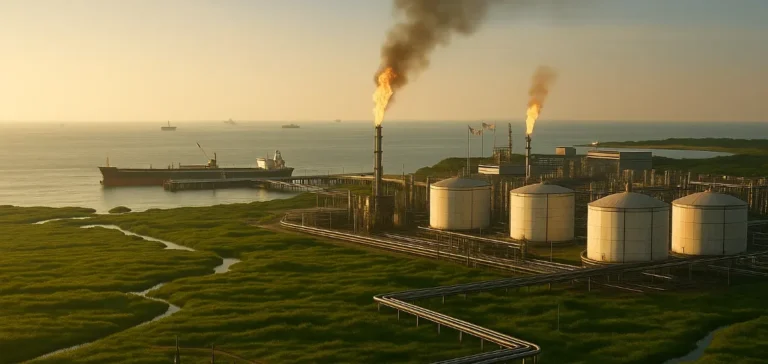Facing a $6.9bn loss in 2023 following a significant reduction in its European market share, Gazprom is actively exploring new business opportunities. The Russian energy firm is now offering petroleum and gas assets located in Nigeria to Pakistan’s Oil and Gas Development Company Limited (OGDCL). This proposal is part of Gazprom’s strategy of expanding into Asia, where the company seeks to strengthen its position by leveraging its African resources. This information emerged from Pakistani media following recent discussions in Moscow between Pakistan’s Energy Minister, Ali Pervaiz Malik, and Gazprom representatives.
Strategic assets in Nigeria
The Nigerian assets covered by this proposal are currently owned or operated by Gazprom as part of its longstanding partnership with the Nigerian National Petroleum Company Limited (NNPC Ltd). Since 2009, Gazprom and NNPC Ltd have cooperated within a joint venture named Nigaz, which initially announced investments of $2.5bn aimed at energy development in Nigeria. This partnership primarily targeted exploration and development of new petroleum and gas fields, as well as building related infrastructure. To date, no official statement regarding this potential asset sale has been made by Nigerian authorities.
A necessary repositioning towards Asia
According to Minister Malik’s statements, a potential partnership with OGDCL could also establish a strategic platform for Gazprom’s offshore exploration activities in Pakistan. Expansion into Asia represents a key initiative for the Russian company, which faces substantial contraction in its European operations due to economic sanctions related to the Ukraine conflict. The offer to Islamabad thus appears to accelerate Gazprom’s establishment in Asian markets, considered essential. The Russian firm, however, has yet to officially disclose precise details of the proposal, leaving several questions regarding the exact conditions of the envisioned agreement.
Gazprom continues its internationalisation efforts amid challenging financial circumstances, actively seeking alternatives to compensate for heavy European market losses. The strategic relevance of the Nigerian assets within this expansion project remains to be clarified by the involved parties.






















